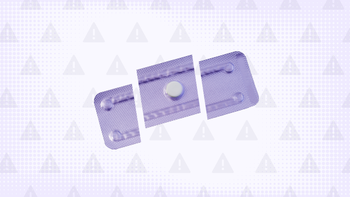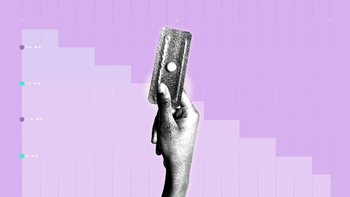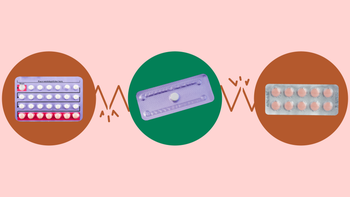
Ella
Ella (ulipristal) is an emergency contraceptive pill that works well to prevent pregnancy. For it to work best, you should take it within 5 days of unprotected sex. Keep in mind that Ella (ulipristal) won't stop a pregnancy that has already started and won't protect you from sexually transmitted infections (STIs). Side effects of Ella (ulipristal) are similar to those of another contraceptive pill, levonorgestrel (Plan B), which include nausea, cramps, and headache. But unlike levonorgestrel (Plan B), Ella (ulipristal) isn't available over the counter (OTC).

What is Ella (ulipristal)?
What is Ella (ulipristal) used for?
Emergency contraception
How Ella (ulipristal) works
Ella (ulipristal) prevents pregnancy by blocking the hormone progesterone from working. Typically, progesterone is the hormone responsible for helping your body release the egg during ovulation and for helping the fertilized egg implant in the uterus (womb). By blocking progesterone, Ella (ulipristal) temporarily stopping your ovaries from releasing an egg. It might also cause changes to the lining in your uterus (womb), preventing a fertilized egg from implanting.
Drug Facts
More on Ella (ulipristal) essentials

Get your GoodRx coupon

What are the side effects of Ella (ulipristal)?
Common Side Effects
- Next period is late (19%)
- Headache (18-19%)
- Nausea (12-13%)
- Stomach pain (8-15%)
- Menstrual cramps (7-13%)
Other Side Effects
- Next period is early
- Tiredness
- Dizziness
Serious Side Effects
- Ectopic pregnancy: severe, unexplainable pelvic pain along with unusual vaginal bleeding
Source: DailyMed
More on Ella (ulipristal) side effects
The following side effects have also been reported
Along with its needed effects, a medicine may cause some unwanted effects. Although not all of these side effects may occur, if they do occur they may need medical attention.
Check with your doctor immediately if any of the following side effects occur:
Some side effects may occur that usually do not need medical attention. These side effects may go away during treatment as your body adjusts to the medicine. Also, your health care professional may be able to tell you about ways to prevent or reduce some of these side effects. Check with your health care professional if any of the following side effects continue or are bothersome or if you have any questions about them:
Less common
Dizziness
Other side effects not listed may also occur in some patients. If you notice any other effects, check with your healthcare professional.
Call your doctor for medical advice about side effects. You may report side effects to the FDA at 1-800-FDA-1088.

Pros and cons of Ella (ulipristal)

Pros
A single pill that's taken as a one-time dose
Can be taken up to 5 days after unprotected sex
Most effective emergency contraception pill available
Has mild and quick-passing side effects for most people
Can be taken by children under 18 years old as long as they've gotten their first period

Cons
Unlike other emergency contraception pills, it isn't available OTC
Should only be used once per menstrual cycle
Won't stop an unwanted pregnancy that's already started
Can interact with some hormonal birth controls (see FAQ)
Doesn't protect against HIV or other sexually transmitted infections

Pharmacist tips for Ella (ulipristal)

You can take Ella (ulipristal) with or without food at any time. Nausea is a possible side effect, so if you tend to be sensitive to medications, taking this medication with food can help lessen the nausea.
You must take Ella (ulipristal) within 5 days from the time you have unprotected sex. The sooner you take it after unprotected sex, the better it will work to prevent pregnancy.
If you vomit within 3 hours of taking Ella (ulipristal), contact your healthcare provider as soon as possible. You might have to take another dose of Ella (ulipristal) for it to work.
Don't use Ella (ulipristal) more than once in the same menstrual cycle. Experts don't know if taking it more often than that is safe.
If you want to start hormonal birth controls, you need to wait at least 5 days after taking Ella (ulipristal) before you can do so. Once you start, continue to use a reliable barrier contraceptive method, such as condoms, every time you have sex until your next period.
After taking Ella (ulipristal), your next period might be a few days early or late. However, if your next period is more than 7 days late, take a home pregnancy test. This could be a sign that Ella (ulipristal) didn't work and you might be pregnant.
Ella (ulipristal) doesn't protect you from HIV or other sexually transmitted infections. Abstinence and condoms can help prevent you from getting them. Talk to your provider right away if this is a concern for you.

Frequently asked questions about Ella (ulipristal)

How to save using GoodRx




What are the risks and warnings for Ella (ulipristal)?
Ella (ulipristal) can cause some serious health issues. This risk may be even higher for certain groups. If this worries you, talk to your doctor or pharmacist about other options.

Don't take if already pregnant
Ella (ulipristal) only helps prevent a pregnancy after unprotected sex. It doesn't stop a pregnancy that has already started. If you want to terminate a pregnancy, please speak with your provider. This isn't a safe or effective option for ending a pregnancy.

Pregnancy outside of the womb
Ectopic pregnancies happen when a fertilized egg implants somewhere other than your uterus. They're very rare, but can be life-threatening and sometimes need to be treated with surgery. Ella (ulipristal) won't cause an ectopic pregnancy, but it's possible to have one after taking this medication. If you experience unexplained or severe pelvic pain along with unusual vaginal bleeding 3 to 5 weeks after taking Ella (ulipristal), let your provider know.

Not for use regularly
Experts don't know if Ella (ulipristal) is safe to use more than once during the same menstrual cycle. Don't use Ella (ulipristal) as a regular method of birth control. If you need birth control, your provider can help you pick one that you can use on a regular basis. If you use Ella (ulipristal) to prevent an unwanted pregnancy, make sure to use a barrier method of birth control (such as condoms) until your next menstrual period.

Interactions with other medications
Make sure you tell your provider and pharmacist about all the medications you're taking, because certain medications (e.g., rifampin) might interact with Ella (ulipristal) and make it not work well. This can raise your risk for pregnancy.

Irregular period
It's common for your next period to start slightly early or late (usually about 2 days) after taking Ella (ulipristal). If your period is late by more than a week, take a home pregnancy test.

Sexually transmitted infections
Most birth control options, including emergency contraception like Ella (ulipristal), don't protect against sexually transmitted infections (STIs). To lower your risk of STIs, you should use condoms. Please tell your provider if you've had barrier-free sex and are worried about whether you might have gotten an STI.

Fertility after use
After using Ella (ulipristal), you could get pregnant as soon as its effects wear off after a few days. To be safe, use a reliable barrier method (e.g., condom) until your next menstrual period.
If you want to start birth control pills, you must wait 5 days after taking Ella (ulipristal). You should continue to use condoms until your next menstrual period. Make sure to talk with your provider if you need a prescription or recommendation for a reliable form of birth control.

Ella (ulipristal) dosage forms

| Dosage | Quantity | Price as low as | Price per unit |
|---|---|---|---|
| 30mg | 1 tablet | $45.40 | $45.40 |
Typical dosing for Ella (ulipristal)
A package of Ella contains a single ulipristal 30 mg tablet.
The typical dose is to take 30 mg by mouth as soon as possible within 5 days of unprotected sex.
More on Ella (ulipristal) dosage forms

Interactions between Ella (ulipristal) and other drugs
More on Ella (ulipristal) interactions
Using this medicine with any of the following medicines is not recommended. Your doctor may decide not to treat you with this medication or change some of the other medicines you take.
Using this medicine with any of the following medicines is usually not recommended, but may be required in some cases. If both medicines are prescribed together, your doctor may change the dose or how often you use one or both of the medicines.
- Amobarbital
- Apalutamide
- Aprepitant
- Aprobarbital
- Armodafinil
- Artemether
- Barbital
- Bexarotene
- Brigatinib
- Butabarbital
- Butalbital
- Carbamazepine
- Cenobamate
- Clobazam
- Dabrafenib
- Darunavir
- Desogestrel
- Dexamethasone
- Dienogest
- Drospirenone
- Efavirenz
- Elagolix
- Elvitegravir
- Encorafenib
- Enzalutamide
- Eslicarbazepine Acetate
- Estradiol
- Ethinyl Estradiol
- Ethynodiol
- Etonogestrel
- Etravirine
- Fosaprepitant
- Fosphenytoin
- Gestodene
- Griseofulvin
- Hexobarbital
- Isotretinoin
- Ivosidenib
- Lesinurad
- Levonorgestrel
- Lorlatinib
- Lumacaftor
- Medroxyprogesterone
- Mephobarbital
- Mestranol
- Methohexital
- Mitotane
- Modafinil
- Mycophenolic Acid
- Nafcillin
- Nevirapine
- Nilotinib
- Nomegestrol
- Norelgestromin
- Norethindrone
- Norgestimate
- Norgestrel
- Pentobarbital
- Phenobarbital
- Phenylbutazone
- Phenytoin
- Pitolisant
- Prednisone
- Primidone
- Quinidine
- Red Clover
- Rifabutin
- Rifampin
- Rifapentine
- Secobarbital
- Segesterone
- St John's Wort
- Sugammadex
- Tazemetostat
- Thiopental
- Topiramate
- Vinblastine

How much does Ella (ulipristal) cost?

Ella (ulipristal) contraindications
Use while pregnant (or if there's a chance you might already be pregnant)

What are alternatives to Ella (ulipristal)?
Emergency contraception

What is the latest news about Ella (ulipristal)?

Ella (ulipristal) images
Get savings updates for Ella (ulipristal)
Receive price alerts, news, and other messages from GoodRx about Ella (ulipristal) and other healthcare topics and relevant savings offers.By providing your email, you consent to receive marketing communications from GoodRx, which may include content and/or data related to men’s health, women's health, reproductive care, or sexual health. You agree to the GoodRx Terms of Use and acknowledge the Privacy Policy. You can unsubscribe at any time.
References
Best studies we foundCenters for Disease Control and Prevention. (2023). How You Can Prevent Sexually Transmitted Diseases.
HRA PHARMA AMERICA, INC. (2023). ELLA- ulipristal acetate tablet [package insert]. DailyMed.
Kim, A., et al. (2011). Ulipristal Acetate (ella). P&T: A Peer-Reviewed Journal for Formulary Management.
Miech, R. P. (2011). Immunopharmacology of ulipristal as an emergency contraceptive. International Journal of Women's Health.
Moreau, C., et al. (2012). Results from pooled Phase III studies of ulipristal acetate for emergency contraception. Contraception.
Office on Women’s Health. (2023). Emergency contraception. U.S. Department of Health and Human Services.
U.S. Food and Drug Administration. (2022). Prescription-to-Nonprescription (Rx-to-OTC) Switches.
World Health Organization. (2021). Emergency contraception.
Browse medications
View AllResearch prescriptions and over-the-counter medications from A to Z, compare drug prices, and start saving.












